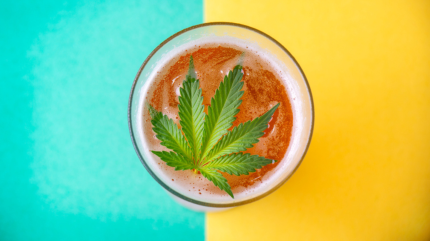
A long-running US survey of the country’s drinkers and cannabis users has found the daily use of marijuana has outpaced alcohol for the first time.
The paper recorded more daily and near-daily (DND) users of cannabis than alcohol in 2022, with 17.7 million cannabis users compared to 14.7 million DND drinkers.

Discover B2B Marketing That Performs
Combine business intelligence and editorial excellence to reach engaged professionals across 36 leading media platforms.
The findings were published in the Society for the Study of Addiction’s journal Addiction by Jonathan Caulkins. The latest update is part of a 43-year spanning survey of self-reported use.
In its 2022 survey, the paper notes that median drinkers reported consuming alcohol four to five days in a month, while cannabis users had taken the drug 15 to 16 times that month.
“Far more people drink than use marijuana,” Caulkins said. “Nonetheless, respondents reported almost two-thirds as many days of marijuana use as alcohol use (678 million vs 1,096 million per month in 2022), because high-frequency use is more common with marijuana.”
The paper comprised 1.6 million participants across 27 studies conducted between 1979 and 2022.

US Tariffs are shifting - will you react or anticipate?
Don’t let policy changes catch you off guard. Stay proactive with real-time data and expert analysis.
By GlobalDataA limitation of the data is it is on a self-report basis. The reports of cannabis use may be rising as it becomes more “normalised” and changes may be less pronounced, the paper cautions.
It found there was a 15-fold increase in the per capita rate of reporting the daily use of cannabis between 1992 and 2022.
“The trends mirror changes in policy, with declines during periods of greater restriction and growth during periods of policy liberalisation. That does not mean policy drove changes in use,” Caulkins added.
“Both could have been manifestations of changes in underlying culture and attitudes. However, whichever way causal arrows point, cannabis use now appears to be on a fundamentally different scale than it was before legalisation.”
Earlier this month, US President Joe Biden set out plans to reclassify marijuana as a less addictive drug under federal law, consequently carrying fewer penalties for possession or sale.
Marijuana has a so-called schedule one status in the Drug Enforcement Administration’s (DEA) Controlled Substances Act, placing it on the same level as heroin and methamphetamine.
Marijuana is already legalised for adult use in 24 US states. Seventeen states had already approved its use for medical purposes.
Speaking to Just Drinks this week Trevor Stirling, an equity analyst covering the beverages sector at AllianceBernstein, said the rescheduling could make it easier for states that currently do not have medical cannabis but he did not believe the move would have a major impact on the beverage sector.
“States have already legalised medical cannabis, so in terms of incremental consumption, I don’t think there’s much that’s going to come out of this,” Stirling said.
“It doesn’t really change the attitude to recreational cannabis use at all at a federal level but it does make it a slightly less heavily regulated drug.”





